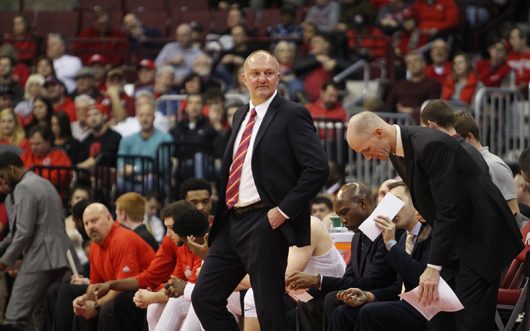
OSU basketball coach Thad Matta looks downcourt during the Buckeyes game against Rutgers on Feb. 8. Credit: Lantern file photo
The Thad Matta era of Ohio State men’s basketball has ended.
Matta and OSU Athletics Director Gene Smith announced Monday during a press conference at the Schottenstein Center that Matta’s time at OSU has concluded after 13 seasons at the helm. A national search for Matta’s replacement will begin immediately.
“Thad and I at the end of this season, had a sit-down meeting and talked about the goals and objectives that I felt we needed and he felt we needed in order to get our program back to where he built it. And during that conversation, it became apparent to me, that we probably needed to facilitate a change,” Smith said.
An emotional Matta expressed gratitude toward his family, fellow coaches, employees at the Schottenstein Center and all the players he has led over the years while reflecting on his time at OSU.
“This has been probably the greatest 13 years of my life,” Matta said. “Just looking around here and seeing all these things that the guys have been able to accomplish, it’s been awesome.”
Since the end of the 2012-13 season, Matta’s program has been on a steady decline since a streak of four consecutive Sweet 16 appearances from 2010 to 2013 and two Final Four appearances in a six-year span. OSU won just one NCAA Tournament game in the past four seasons and failed to make the tournament the last two years.
In 2016-17, OSU failed to win 20 games for the first time in Matta’s tenure in Columbus, going 17-15 with a first-round exit to Rutgers in the Big Ten tournament and did not make the NIT.
But the down season for the Buckeyes was not cited among the major deciding factors into Matta’s exit at OSU by Smith. Instead, Smith said the recent struggles with recruiting prompted the conversation that ended Matta’s time with the Buckeyes.
“We weren’t winning the battles in recruiting that I thought we might have a chance to win, as he did,” Smith said. “And so we started talking about that on Friday, which was three months or so after that meeting we had. It’s the flow of the conversation took to me to the reality that you know what, as I said to him, Thad, maybe it’s time for us to make a leadership change. And he agreed. Recruiting as we all know, is the life-blood of this program.”
Ultimately, one of the major deciding factors in the coaching change came down to the health of the former head coach. Matta said his health was becoming a concern for both him and his family, and that he will take the time after coaching to focus on getting healthy.
“I’m going to say my whole focus right now, is trying to get healthy. That’s all I am concerned about,” Matta said. “I mean, I don’t think anybody can truly comprehend what this job — coaching — does to you. It’s the things that I went through a year where I couldn’t walk, I couldn’t take my shoes off after a game, I couldn’t take my pants off after a game.”
Matta’s head-coaching career began at his alma mater, Butler University, where he spent three seasons as an assistant with the Bulldogs before transitioning to the role of head coach in 2001. He then left Indianapolis for the head-coaching job at Xavier, which he held for three years, from 2002-2004, before accepting the job at OSU.
Matta will leave OSU as the all-time winningest coach in program history at 337 wins and as the most-tenured coach with 460 games coached after 13 seasons.
Matta led OSU to five Big Ten regular-season championships, four Big Ten tournament championships and nine NCAA Tournament appearances.
Leaving the Buckeyes, Matta said he hopes that people remember him not for the coach and for the accomplishments he led OSU to, but instead he hopes to be remembered for the person he was and for coaching “the right way.”
“I hope, No. 1, that I’m remembered as a really good person. And a guy who cared about the university, a guy that cared about his players,” Matta said. “The wins, the losses, those things, they come. We hit a stretch here that was probably about a five-year stretch as good as anybody in the country in terms of college basketball. And I think the last thing that I hope I’m always remembered for is that we always did it the right way. And that to me is something that I want to hold or hang my hat on. That this program was run the right way.”
Edward Sutelan and Colin Hass-Hill contributed to the story.


